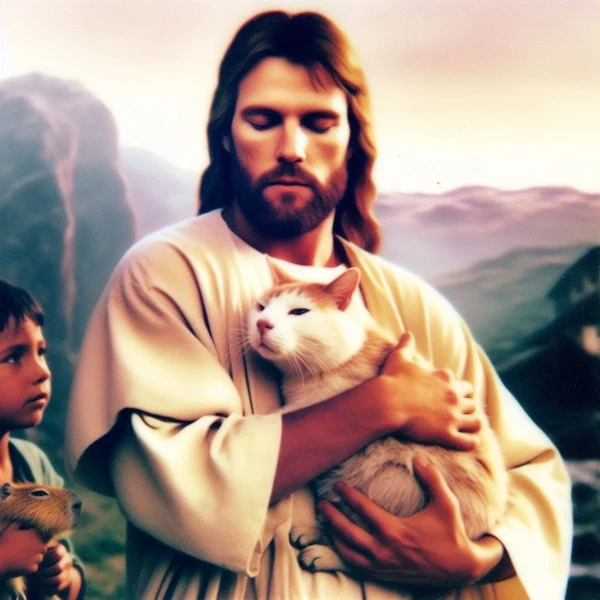I am bringing questions from DMs with @Nightcrawler to public posts so that others can benefit and to fund his gambling habit
Corinthian pointed me to this bishop and his perspective on hell. This includes an FAQ in which the bishop is asked
"Did Bishop Barron tell Ben Shapiro, a practicing Jew, that he was saved? Does he believe that Christ is only the "privileged route" to salvation?" (click for answer)
No. Bishop Barron did not tell Ben Shapiro he was saved (or even that he was likely to be saved), and he does not believe that Christ is just one of many routes to salvation. Here's what Bishop Barron said on Ben Shapiro's show, in its full context. The excerpt below is from 16:19-18:07 in their YouTube conversation:
BEN SHAPIRO: I promised awkward questions, and so there shall be. So let's start with the most awkward of the awkward questions. I don't really care about this question particularly much, but I get this question a lot: As a Jew, how does it feel that there are other religions that don't think you're getting into heaven? So let me ask you: What's the Catholic view on who gets into heaven and who doesn't? I feel like I lead a pretty good life, a very religiously based life, in which I try to keep not just the Ten Commandments but a solid 603 other commandments as well, and I spend an awful lot of my time promulgating what I would consider to be Judeo-Christian virtues, particularly in Western societies. So, what's the Catholic view of me? Am I basically screwed here?
BISHOP BARRON: No [i.e., Ben is not "basically screwed"]. The Catholic view, go back to the Second Vatican Council, says it very clearly. Christ is the privileged route to salvation: "For God so loved the world he gave His only Son that we might find eternal life." So, that's the privileged route.
However, Vatican II clearly teaches that someone outside the explicit Christian faith can be saved [cf. Lumen Gentium 16]. Now, they're saved through the grace of Christ, indirectly received. So the grace is coming from Christ. But it might be received according to your conscience. So, if you're following your conscience sincerely, or in your case, you're following the commandments of the Law sincerely, yeah, you can be saved.
Now, that doesn't conduce to a complete relativism. I mean we [Catholics] still would say the privileged route and the route that God has offered to humanity is the route of his Son. But you [a non-Christian] can be saved. Even Vatican II says an atheist of good will can be saved in following his conscience.
John Henry Newman said the conscience is the "aboriginal vicar of Christ in the soul." It's a very interesting characterization, that [the conscience] is in fact the voice of Christ. If he's the logos made flesh, if he's the divine mind or reason made flesh, then when I follow my conscience, I'm following him whether I know it explicitly or not. So, even the atheist, Vatican II teaches, of good will, can be saved.
Why does Bishop Barron refer to Christ as the "privileged route" to salvation? The surrounding context of the discussion makes it clear: he was talking not about Christ himself, but about explicit faith in Christ. First, note how Ben's initial question was whether he was "basically screwed" in terms of salvation since he's a practicing Jew. That was his fundamental question. And the Catholic teaching, articulated by Vatican II and the Catechism (CCC 847) and presented by Bishop Barron, is "no." A non-Christian—"someone outside the explicit Christian faith"—can be saved. (And notice how he repeatedly emphasizes the word "can"—because this only means that such salvation is possible, not that it is unconditional or likely or easy.
He also goes on to point out that this does not conduce to religious relativism—because "the fullness of the means of salvation" [CCC 830] is on offer only in the Catholic Church.) Second, Bishop Barron immediately clarifies that anyone who is saved is saved through the grace of Christ. In other words, Christ is unquestionably the only route to salvation (John 14:6; Acts 4:12). It would have been an absurd self-contradiction for Bishop Barron to add this point, which underscores the necessity of Christ for salvation, if he really believed that one could be saved outside of Christ.
Lastly, Bishop Barron has written and preached often about the uniqueness and centrality of Christ for the salvation of the world, and in fact, has made Christocentrism the cornerstone principle of the Word on Fire movement. For example, in his homily "Getting St. Peter's Sermon Right" (which offers a helpful summary of this question), he says: "Salvation, as God fully intends it, is on offer in Jesus and in him alone." If you watch this full segment, interpreting Bishop Barron's words in context and with charity (instead of employing the hermeneutic of suspicion), it's clear that he was simply affirming the teachings of Vatican II about the possibility of salvation for non-Christians.
If someone still disagrees with the content of his response, it's not Bishop Barron they're fundamentally disagreeing with, but Catholic teaching.
(It also has to be noted that, compared to its relationship with people of other religions or no religion, the Catholic Church's relationship with the Jewish people, "the first to hear the Word of God" [CCC 839] and a common target of violent discrimination throughout history, is unique. It calls for—as Pope Benedict XVI has said—"a humble and sensitive" witness based on dialogue. This is why, beginning with the publication of Nostra Aetate in 1965 and continuing over the decades of subsequent papacies, the Church has acknowledged its closeness to the Jewish people and emphasized greater dialogue with the Jewish community. For more information, click here.)
Can Ben Shapiro be saved by sacrificing goats? There are lots of instances of animal sacrifice in the Bible, with the purpose apparently to purify oneself. I'm fairly sure Christians would say that doesn't work, but if it doesn't, then what was the point of sacrificing all those goats?






.webp?h=8)

Jump in the discussion.
No email address required.
"Each of you knows that the foundation of our faith is charity. Without it, our religion would crumble. We will never be truly Catholic unless we conform our entire lives to the two commandments that are the essence of the Catholic faith: to love the Lord, our God, with all our strength, and to love our neighbor as ourselves… With charity, we sow the seeds of that true peace which only our faith in Jesus Christ can give us by making us all brothers and sisters. I know that this way is steep, and difficult, and strewn with thorns, while at first glance the other path seems easier, more pleasant, and more satisfying. But the fact is, if we could look into the hearts of those who follow the perverse paths of this world, we would see that they lack the serenity that comes to those who have faced a thousand difficulties and who have renounced material pleasure to follow God's law."-Blessed Piero Giorgio Frassati
Snapshots:
this bishop:
ghostarchive.org
archive.org
archive.ph (click to archive)
Jump in the discussion.
No email address required.
More options
Context